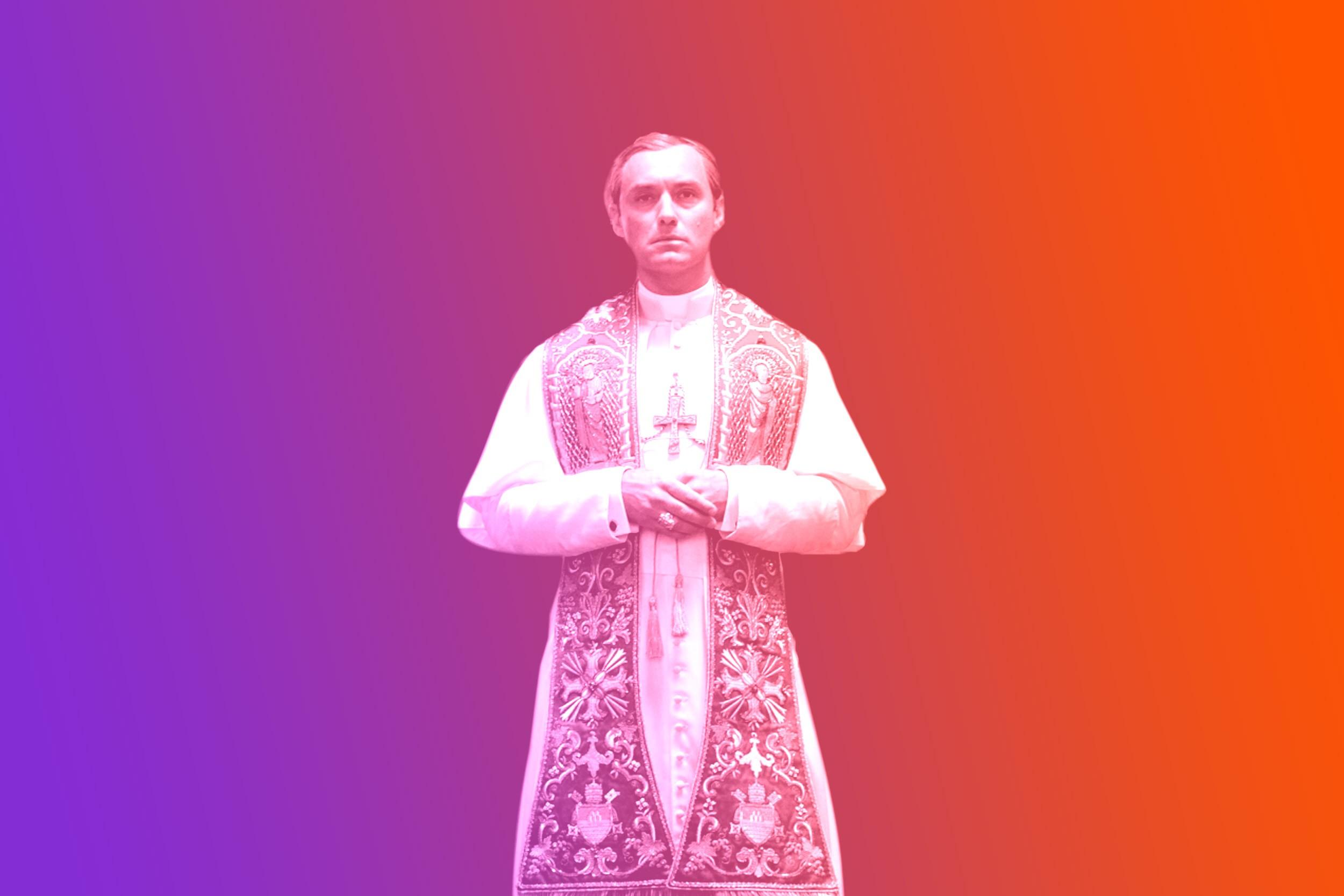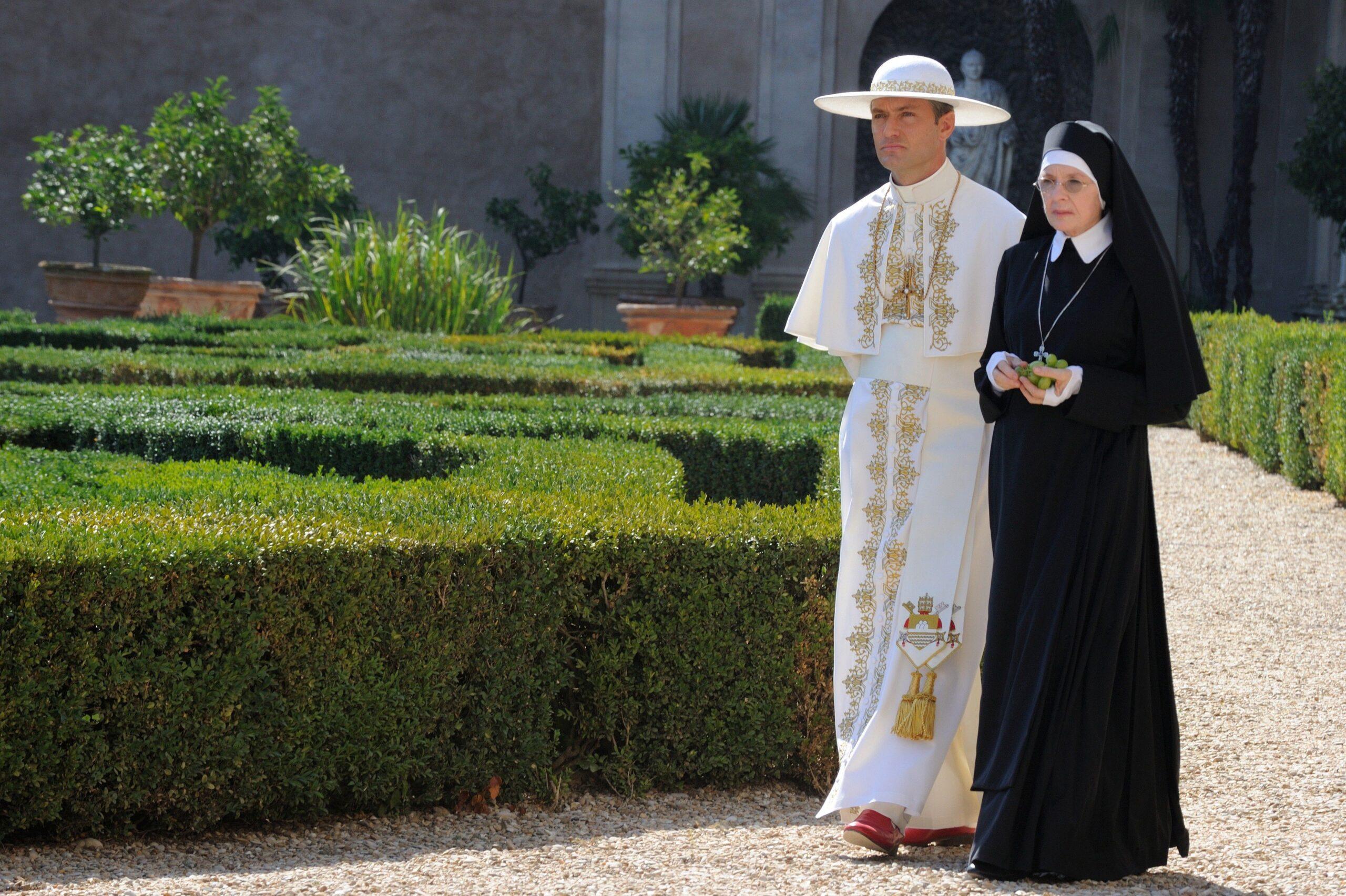
A warning: There’s the Young Pope that exists on the internet, and the Young Pope that exists on the screen. It’s going to take you a while to reconcile the two, even though they both involve Jude Law smoking more than a papal conclave. Here’s the wild thing: The real Young Pope is slightly less fond of Peter Bjorn & John than his virtual counterpart, but even more unhinged.
The online frenzy surrounding the show, an American-European coproduction that premiered on the Continent in late October and lands stateside this Sunday on HBO, proves something of a mixed blessing for Italian auteur Paolo Sorrentino’s television debut. On the one hand, all publicity is good publicity; as some especially sanctimonious party poopers have pointed out, the sight of a resplendent Law in papal get-ups has hypnotized us into doing the work of HBO’s publicity department for them. To which the rest of the internet responded: Go sit in the corner and well-actually some small children about Santa Claus. Memes are fun.
After some minor frissons in response to trailers and promo art, said memes peaked a few days ago, when they were officially anointed with a prestige-publication explainer and an entry in the online encyclopedia Know Your Meme. They’re a collective snigger at the series’ extremely literal-minded premise — Law plays a pope who is new, and also not old — channeled into the kind of joyfully random template Twitter sometimes mutually agrees upon. There’s no reason why “this show sounds like a terrible idea” automatically translates to “song lyrics, but with The Young Pope in them,” and yet:
Lyrics are only the most dominant subgenre of Young Pope cracks. Others have abandoned the rigid confines of song structure in favor of a more direct approach:
It’s easy to see what makes The Young Pope so inherently clown-able. First and foremost, it’s called The Young Pope, which is like if Mad Men were actually about an all-male anger-management therapy group. Second and only slightly shy of foremost, everyone who wears sunglasses inside looks preposterous, especially when they’re the pontiff. But to psychoanalyze a bit, American television is currently awash in the diluted dregs of the antihero model, shows that reduce nuanced explorations of masculinity and its place in our culture to its crudest common denominator: boobs good, the women attached to them bad; violence, impetuousness, and other behavior that earns the label “uncompromising” good, sissies who criticize your methods bad. It’s badass-by-numbers. And as if HBO hadn’t learned from the coke-bloated, nine-figure flop of Richie Finestra, now it’s taking its sexy rebel act to the Catholic Church — an organization whose members are literally not allowed to have sex? Finely honed Twitter zingers may be a niche activity with a very clear provocation, but they’re also expressions of a more generalized, and fairly justified, skepticism toward the concept.
The problem, and the good news, is that The Young Pope as an online phenomenon relies on a version of The Young Pope that doesn’t actually exist: a version that isn’t cognizant of how ridiculous it is, and doesn’t take full advantage of that ridiculousness. If you’re just looking to fire off some jokes in exchange for virtual hearts, or even if you’re HBO — viewers are viewers, ironic or not — that doesn’t change much. It also doesn’t make the gap between the two Young Popes any less fascinating, nor the internet’s ability to create an entire alternate show for the sole purpose of reacting to it sight unseen. All that’s left is to see whether The Young Pope as we’ve joked it into being can coexist with The Young Pope as it actually is.


Those tuning into this weekend’s premiere prepared to smirk will find plenty to point and laugh at, plus prime GIF material so the pointing and laughing may continue in virtual form. It takes some time to realize that The Young Pope is courting those laughs, and aggressively. The opening credits sequence varies depending on the episode, but the most common one sees Law’s Pope Pius XIII, née Lenny Belardo, walking in slow motion down a hallway and winking at the camera. Pius kicks off a meeting with a head of state by telling her, “I know, I’m incredibly handsome.” In a sequence that will almost certainly become the show’s calling card, Pius dons his full papal regalia to the dulcet tones of LMFAO’s “Sexy and I Know It.” If you saw the scene as an isolated clip, you’d assume it was dubbed over by some enterprising account-haver à la that incredible Katie Ledecky/”Smooth” mash-up that went viral during the Olympics. That’s because it’s almost impossible to imagine that a project of such expense and apparent self-seriousness would be this silly and self-deprecating before you see it for yourself. Which is to say, just as silly as the jokes themselves and as they implicitly assumed it was not.
Playful, constantly shifting, and steadily confounding, The Young Pope’s tone won’t come as much of a surprise to those familiar with the work of its director and primary writer. Despite a few English-language films, Sorrentino is still best known in the States as the auteur behind The Great Beauty, which won the Academy Award for Best Foreign Language Film in 2014. Tracking an aging socialite through the excess of Berlusconi-era Rome, The Great Beauty has a similar yen for the outrageous. Despite the prestige boom, it’s still relatively rare in the States for directors of that caliber to transition into TV, and still rarer for them to do so successfully. Quietly, The Young Pope is already the most successful project from a major film director on television with the possible exception of The Knick — and even The Knick doesn’t have Diane Keaton.
The Young Pope even bears a striking resemblance to Twin Peaks, the film-to-TV pivot’s eternal standard-bearer. The term is so overused as to now be almost meaningless, but The Young Pope is one of the few series in recent memory that truly deserves the label “Lynchian.” The show opens with a dream sequence, in which Pius emerges from a giant pile of infants to deliver a homily to St. Peter’s Square. The surrealism bleeds over into real life: The Australian government gifts the Vatican an honest-to-God kangaroo; Pius sets it loose in the papal gardens, where it continues to pop up intermittently. It’s vaguely implied that Pius might have actual supernatural abilities: Keaton’s Sister Mary, the nun who raised him now brought on as consigliere, insists he’s “an actual saint.”
At once funnier than its pulsing-electro promos suggested and more bizarre than anticipated, The Young Pope does more than break the fourth wall — it demolishes it, then strolls through to a different dimension where nuns play soccer and Greenlanders are known for their excellent dancing. The show instantly renders all jokes obsolete, because they’re no longer required to inject a sense of fun. Young Pope, the punch line, has to be humorless and stiff to make for optimal target practice, with an ego inflated enough to puncture. Young Pope, the genuine article, has already beaten you to the joke. It’s still internet catnip, just of a different, less accidental nature.
But all insanity, even knowing insanity, raises the question: What is this for? The actual plot is threadbare, albeit rich with uncomfortable parallels to real life. Pius is elected as a compromise, and various factions think he’ll be easily manipulated. Once in power, the unassuming cipher proves to be an image-obsessed wild card. (This is when the discomfort kicks in.) A hard-core reactionary, Pius wants to bring extremism back into the mainstream of the Church. But halfway through the first season (the first four of eight episodes were provided to critics), The Young Pope hasn’t made the practical impact of that extremism apparent, nor is it in any hurry to. This show is more character study than institutional portrait, and it rests on a borderline psychotic performance from Law, on whose thousand-yard stare and deranged–Jack Torrance line delivery this entire operation rests. Pius XIII will always be Lenny Belardo, and Lenny Belardo will always be an orphan with abandonment issues who’s made Spencer and Mary his surrogate parents and turned a massive state into his own personal score-settling mechanism. There goes the déjà vu again.
The show’s own opinion of Lenny remains deliberately ambiguous. Is he a high-camp supervillain? He certainly compliments his own cunning enough to qualify. Is he some kind of messiah whose ends will justify his means? Vague allusions to his past suggest … maybe. That ambiguity may frustrate some viewers, but I enjoyed it as a sort of antidote to Westworld, a show that resists any attempt to forecast the plot and instead encourages us to revel in the sheer oddity, or sheer silliness, of the moment, and maybe even blog our way out of the daze. The question that awaits The Young Pope is how, in the absence of fan-theory fodder, its unique subspecies of online economy will react to the reality of the show rather than what’s projected onto it. What happens when you make a million memes about a pope and pop songs — and then the pope starts listening to LMFAO?
The discovery that The Young Pope is already on the same page — or at least using pages from the same book to roll pope spliffs — as its would-be satirists might take the wind out of our sails. But it might also yield a happy merger of pre-fab fandom and show, with the holy-shit factor providing a supplementary pleasure that doesn’t detract from the final payoff the way too-accurate-for-its-own-good theorizing does. The Young Pope offers enough aesthetic bounty to enjoy it on quirks alone, or even looks: Sorrentino puts an impressive $45 million budget to good use, convincingly replicating the Vatican’s pomp and circumstance. But The Young Pope is more than just a clever practical joke on prestige television, a mission that didn’t turn out to require the internet’s volunteer assistance. (Twitter doesn’t have to point out that Lenny Belardo = Tony Soprano + delusions of grandeur – sex/drugs/murder to see Sorrentino made him that way.) Instead, it’s the rare Peak TV–era project that immediately stands out as utterly unique, and not just for the borderline-Dada tone of its prerelease hype. We’ll be parsing it long after the memes die out — and maybe even as the new, air-kissing ones roll in.
Disclosure: HBO is an initial investor in The Ringer.